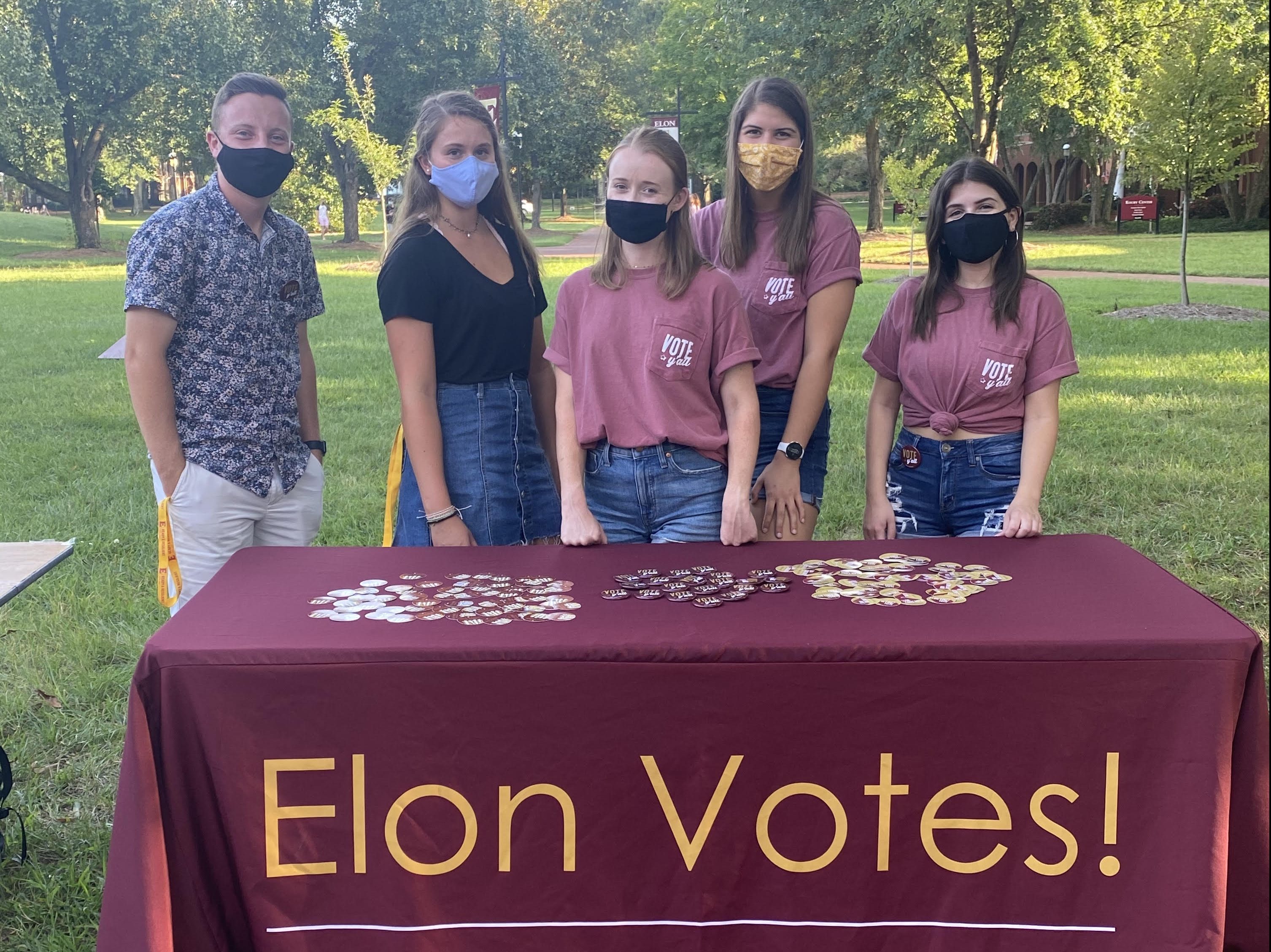Elon students cast ballots at a rate higher than the national average during the 2020 elections and were significantly more engaged in the election than they were four years before.
During a year when college students turned out on Election Day at higher rates, Elon University students set a new standard, with 74 percent casting a ballot in the 2020 elections, according to a new report from the Institute for Democracy & Higher Education (IDHE).
That level is 8 percentage points higher than the national average for college students, and a remarkable 25.2 percentage point increase over Elon’s voting rate during the 2016 elections. The voting rate of students at colleges and universities nationwide ranged from 19 percent to 89 percent. The rates were included in the recently released National Study of Learning, Voting and Engagement, or NSLVE.
“Elon students are civically engaged like never before and it is inspiring,” said Bob Frigo, assistant dean of campus life and director of the Kernodle Center for Civic Life. “These voting rates represent a desire by students to help shape a more representative democracy for the 21st century. We are extremely proud of the students, faculty, and staff who worked tirelessly during the 2020 election to advance political engagement on our campus.”
Nationally, voting rates in 2020 continued an upward trend in higher participation in voting by college students. On campuses across the country, students built on the momentum swing of 2018 and voted at high rates in the 2020 election, with voter turnout jumping to 66 percent in last year’s presidential election. The 14-percentage point increase, from 52 percent turnout in the 2016 election, outpaces that of all Americans, which jumped 6 percentage points from 61 percent to 67 percent from 2016 to 2020, according to the U.S. Census Bureau.
“That students, often younger and first-time voters, turned out at rates commensurate with the general public is nothing short of stunning,” said Nancy Thomas, director of the IDHE, which is located at Tuft University’s Tisch College of Civic Life. “We attribute this high level of participation to many factors, including student activism on issues such as racial injustice, global climate change and voter suppression, as well as increased efforts by educators to reach students and connect them to the issues and to voting resources.”
Elon saw its student voter registration level increase from 78.8 percent in 2016 to 89.9 percent four years later, with 82 percent of those registered to vote casting a ballot in 2020, according to the report. Elon was recognized in 2020 for its voter registration efforts, ranking the top 10 colleges or universities in total registrations and percentage of registrations among undergraduates, according to online voter registration service TurboVote. The nonpartisan student organization Elon Votes! and the nonpartisan collaborative team of the Elon University Political Engagement Work Group played large roles in promoting voter registration, assisting with requesting absentee ballots, encouraging civic participation and other election-related initiatives.
“We have an incredible team of students who worked so hard during a pandemic to encourage their fellow students to participate in the election and to take an active role in choosing those who represent them in government,” said Carrie Eaves, Faculty Fellow for Civic Engagement and associate professor of political science. “Their efforts have produced amazing forward momentum in the area of civic engagement.”
Frigo also noted that the high voter participation rate was made possible by a collaborative partnership between Elon and the Alamance County Board of Elections to support student access to voting. Such partnerships are rare, but demonstrate the high priority that Elon places upon civic engagement and being involved in the democratic process.
“Engagement in the political process is such an important part of Elon’s mission to prepare global citizens and leaders,” said Vice President for Student Life Jon Dooley. “This significant increase in voter participation is the direct result of outstanding work by Elon Votes! and a dedicated coalition of students, staff, and faculty.”
IDHE’s National Study of Learning, Voting, and Engagement (NSLVE, pronounced n-solve) is the nation’s largest study of college and university student voting. Institutions must opt-in to the study, and at this time, nearly 1,200 campuses of all types —community colleges, research universities, minority-serving and women’s colleges, state universities, and private institutions — participate. The dataset reflects all 50 states and the District of Columbia and includes 49 of the nation’s 50 flagship schools. IDHE uses de-identified student records to ensure student privacy. The 2020 dataset is robust with 8,880,700 voting-eligible students representing 1,051 colleges and universities.



